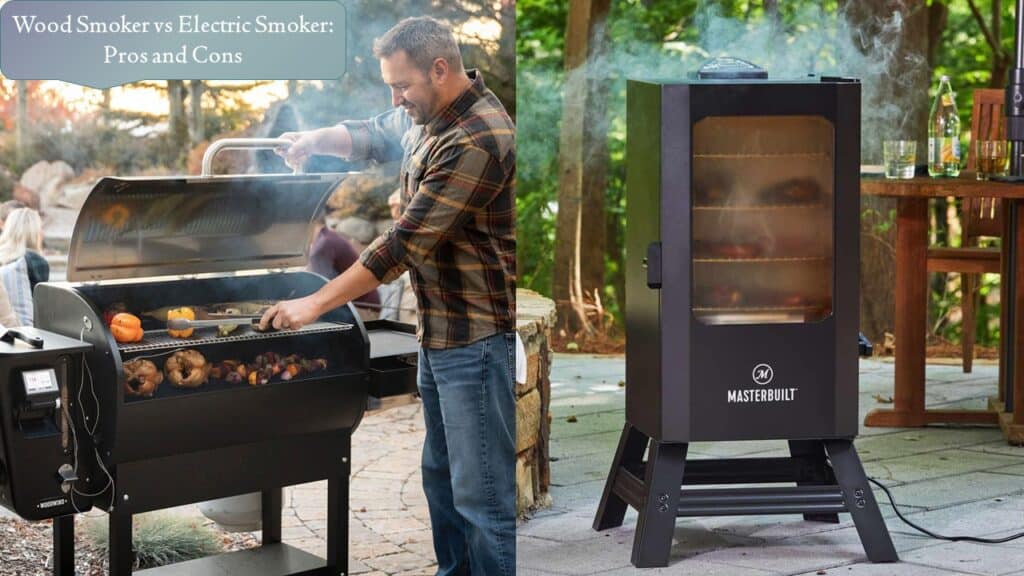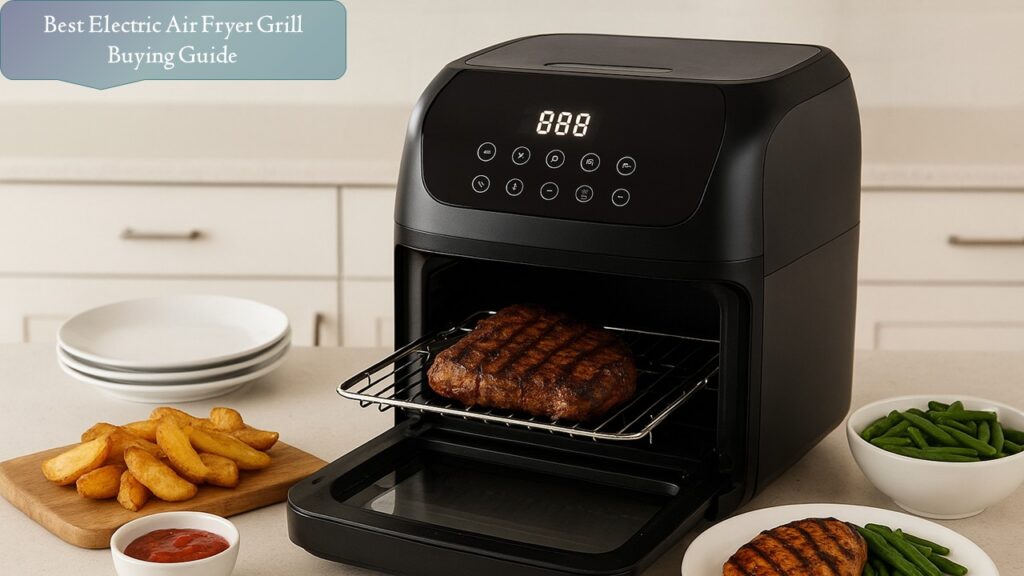There’s something undeniably magical about smoked food, the aroma, the flavor, and the hint of nostalgia it brings. Whether it’s a tender brisket, juicy ribs, or smoky vegetables, smoking elevates any meal to a new level. But for anyone new to the world of smoking, a common question arises: should I go with a traditional wood smoker or a modern electric smoker?
Both have their loyal followers and unique advantages, but the best choice depends on your lifestyle, cooking style, and the flavor profile you crave.
Wood Smoker vs Electric Smoker: Pros and Cons
In this guide, I’ll walk you through the pros and cons of wood smokers and electric smokers based on my personal experience, helping you make a confident decision that fits your needs.
Wood Smoker: Pros and Cons
Wood smokers are the epitome of traditional smoking, relying on burning hardwoods like hickory, oak, or mesquite to generate smoke and heat. This method not only cooks the food slowly and evenly but also imparts a rich, smoky flavor that is difficult to replicate with other types of smokers.
Cooking with a wood smoker requires attention and skill, as maintaining a consistent temperature and choosing the right type of wood can significantly affect the taste and tenderness of your meat. For enthusiasts, the hands-on process and deep flavor rewards make wood smokers a favorite.
Pros:
- Authentic Smoky Flavor
Nothing beats the deep, rich smoky flavor from wood. Different wood types—hickory, apple, cherry—infuse meats with subtle, distinct tastes that are difficult to replicate with electricity alone. - Traditional Cooking Experience
For enthusiasts, the process itself is part of the enjoyment. Controlling the fire, adding wood chunks, and adjusting vents offers a hands-on experience that feels rewarding and immersive. - High Heat for Searing
Wood smokers can achieve higher temperatures, ideal for certain meats that require searing, such as brisket or pork shoulder. - Versatility
With experience, a wood smoker allows more experimental techniques, including cold smoking for cheese and nuts, or even smoking cocktails.
Cons:
- Learning Curve
Managing temperature and smoke levels requires patience and practice. Beginners may find it challenging to maintain consistent heat over long cooking sessions. - Time-Consuming
Smoking with wood is generally slower than electric methods. You need to monitor the fire, add wood periodically, and adjust vents to maintain steady temperature. - Space and Clean-Up
Wood smokers are often bulkier and produce ash and soot, which require extra cleaning and proper outdoor setup. - Weather Dependent
Outdoor conditions such as wind and rain can affect cooking performance, making consistency more difficult.
Electric Smoker: Pros and Cons
Electric smokers are designed for convenience and consistency, using a heating element to produce steady heat while wood chips generate the smoke needed for flavor. They are easier to control than wood smokers, often featuring precise temperature settings, timers, and minimal supervision requirements. Electric smokers are ideal for beginners or anyone who prefers set-it-and-forget-it cooking, as they allow you to achieve flavorful, smoked food without the need to constantly monitor the fire or adjust the heat manually.
Pros:
- Ease of Use
Electric smokers are incredibly user-friendly. Set the temperature, add wood chips for flavor, and walk away. They are perfect for beginners or anyone who wants hassle-free smoking. - Consistent Temperature
Unlike wood smokers, electric models maintain a steady heat level, which is ideal for long smoking sessions without constant monitoring. - Indoor/Outdoor Flexibility
Most electric smokers are designed for backyard use and don’t require constant attention to wind or rain. This makes them convenient for urban or suburban settings. - Less Clean-Up
Electric smokers don’t produce ash in the same way wood smokers do, making cleaning easier and quicker. - Time-Saving
While you won’t get the exact depth of flavor as wood, electric smokers can cook faster due to controlled heating and minimal adjustments.
Cons:
- Less Intense Smoke Flavor
Electric smokers rely on wood chips, which produce less smoke flavor than burning wood. Some purists argue that the taste isn’t as authentic or bold. - Limited Searing Capability
Electric units generally cannot reach extremely high temperatures, so searing meat isn’t as effective as with wood or charcoal smokers. - Dependence on Electricity
You need a reliable power source, which can limit placement options and outdoor flexibility compared to a standalone wood smoker. - Smaller Cooking Capacity
Many electric smokers are compact, making them less suitable for large gatherings unless you invest in higher-end, larger models.
Key Differences at a Glance
| Feature | Wood Smoker | Electric Smoker |
| Flavor | Authentic, bold smoky flavor | Milder smoke flavor via wood chips |
| Temperature Control | Manual, requires experience | Precise, automated |
| Ease of Use | Requires constant attention | Beginner-friendly, set and forget |
| Cooking Speed | Slower | Faster and consistent |
| Maintenance & Clean-Up | More ash, soot, and outdoor setup | Minimal, easy to clean |
| Searing Ability | Excellent for high-heat searing | Limited heat, less effective searing |
| Weather Sensitivity | High | Moderate to low |
| Ideal For | Enthusiasts, traditional smokers | Beginners, convenience-focused users |
My Experience With Both:
Having used both types extensively, I can confidently say that each has its place in the kitchen or backyard. The wood smoker is perfect for weekends, when I have time to experiment with different wood flavors and enjoy the ritual of fire management. The meats come out with a depth of flavor that feels unmatched, especially brisket and ribs.
On the other hand, my electric smoker shines during weeknights or casual gatherings. I can prepare a full meal without hovering over the fire, set the temperature, and return a few hours later to perfectly smoked chicken or salmon. While the flavor is slightly milder, it’s incredibly consistent and convenient.







